
- Details
- By Chez Oxendine
- Energy | Environment
Around $2 billion in clean energy funding is officially headed to Indian Country, after the Environmental Protection Agency announced Friday it had fully obligated the $27 billion allocated by the Greenhouse Gas Reduction Fund (GGRF) to 68 awardees across three grant programs. With the move, the Biden administration ensured that the commitments are virtually irrevocable, even if there’s a shift in the White House in 2025.
Environmental Protection Agency today announced it has fully obligated the $27 billion allocated by the Greenhouse Gas Reduction Fund (GGRF) to 68 awardees across three grant programs. By officially obligating the funds, the Biden administration ensures that the commitments are virtually irrevocable, even if there’s a shift in the White House in 2025.
The GGRF is funded by the Inflation Reduction Act (IRA) of 2022, a signature achievement of the Biden administration and the largest climate investment in history, according to the EPA. The funding under GGRF, which is weighted toward low-income and disadvantaged communities, includes an estimated $2 billion that will flow into tribal communities via the GGRF’s three programs:
- The National Clean Investment Fund, which establishes large-scale renewable energy financing support, will distribute $14 billion to three awardees.The Climate United Fund, which received $6.97 billion, has pledged at least 10% of its investments directly to tribal communities.
- The Clean Communities Investment Accelerator will use $6 billion to establish financing hubs under its five awardees, aimed at offering subgrants for smaller scale projects such as residential solar and energy efficiency upgrades. One Native-serving awardee is the Native CDFI Network, which received $400 million to support 58 Native CDFIs and five other Native financial institutions with technical assistance, capacity building, and capital for clean energy loans.
- The Solar For All program will use $7 billion across 60 awardees to support energy projects in low-income and marginalized communities. More than $500 million will be sent directly to tribes and Native-led organizations, such as the Midwest Tribal Energy Resources Association, which received $62 million to support 35 tribes in their solar energy efforts. In addition, there are more funds committed through other nonprofits and programs in states like Washington, where the State Department of Commerce plans to consult tribes on how to best allocate a portion of its $156 million award to tribal energy.
In total, NCIF and CCIA recipients will dedicate almost $1.5 billion for tribal communities, which represents about 7% of the overall funding under those two programs, according to today’s announcement.
As well, more than $500 million – over 7% of Solar for All funding – will be dedicated to tribal communities, according to the EPA’s website, which notes: “Tribes across the nation will have greater access to programs that reduce energy costs and deliver electricity during outages.”
With funds now accessible to the award recipients, “programs that give communities access to the resources and investment capital to build cleaner, more sustainable economies can begin being implemented,” the agency wrote.
EPA Administrator Michael S. Regan emphasized the importance of delivering on the IRA’s promise to reduce emissions, lower energy costs, create good-paying jobs, and advance environmental justice.
“With climate impacts increasingly impacting all Americans, and especially those in communities that have been historically left behind, EPA knew it had to move swiftly and deliberately to get this historic funding out the door,” Regan said in a statement.
Today’s announcement comes amid calls from conservative groups to dismantle the IRA, one of the Biden administration’s signature achievements. Led by the Competitive Enterprise Institute, a coalition of free market groups wrote to Congress that the best way forward is to use the budget reconciliation process to eliminate the law’s subsidies, “in a manner to ensure a net tax cut.”
The IRA would also be at risk under the authoritarian framework proposed by Project 2025, according to a report by the Center for American Progress, which warns that the Heritage Foundation-authored plan threatens to reverse climate progress and undermine investments in clean energy.
